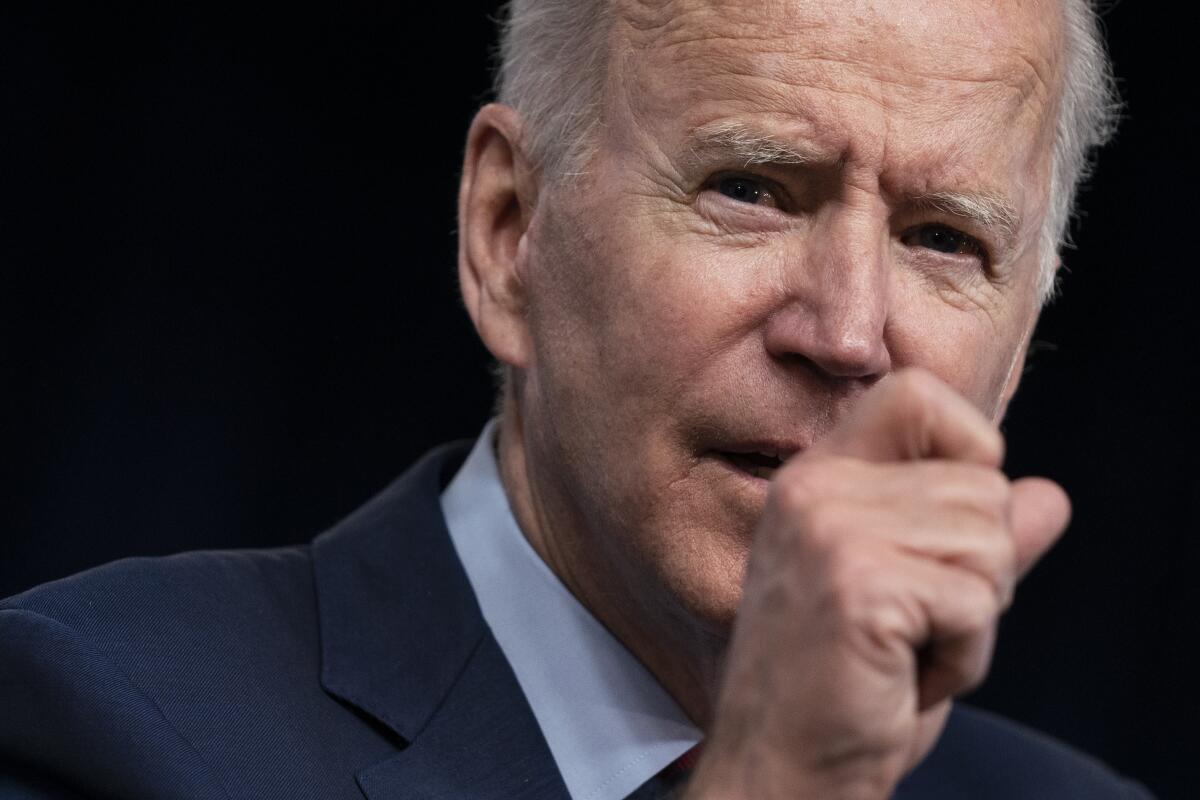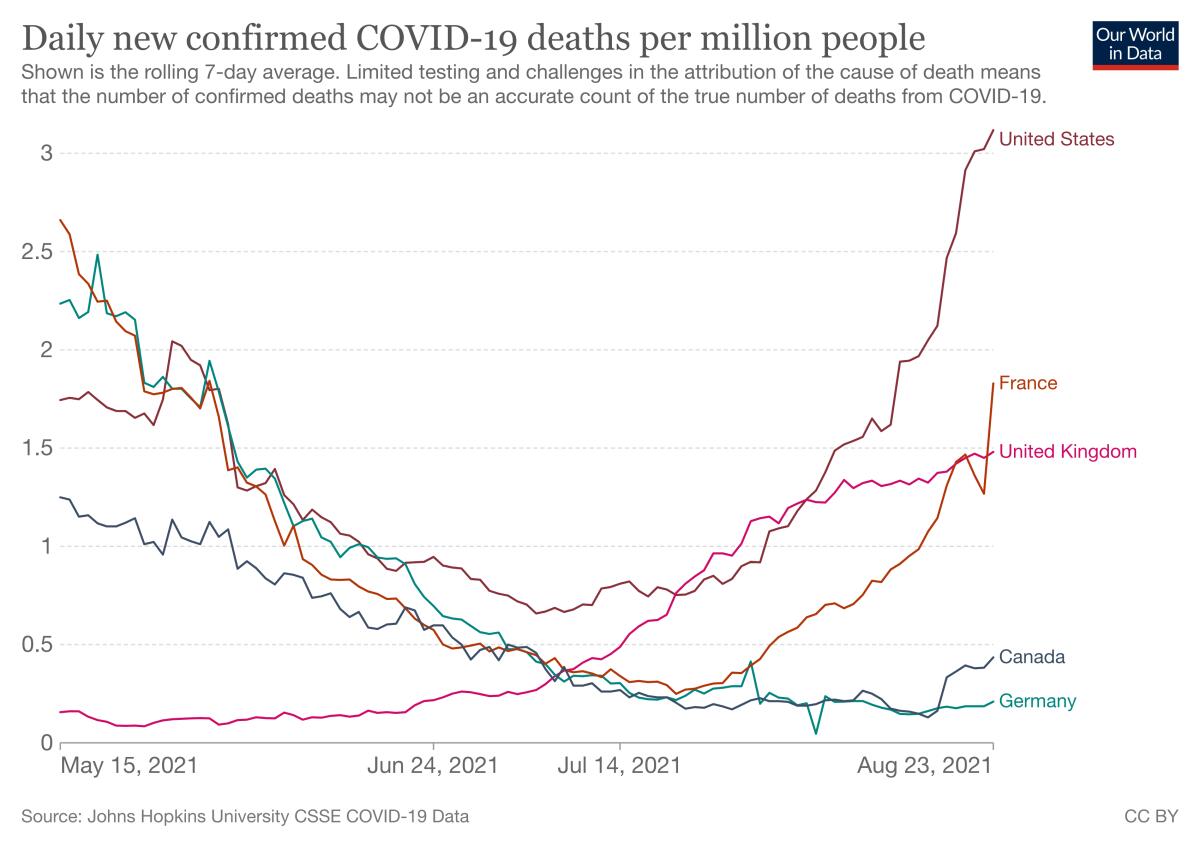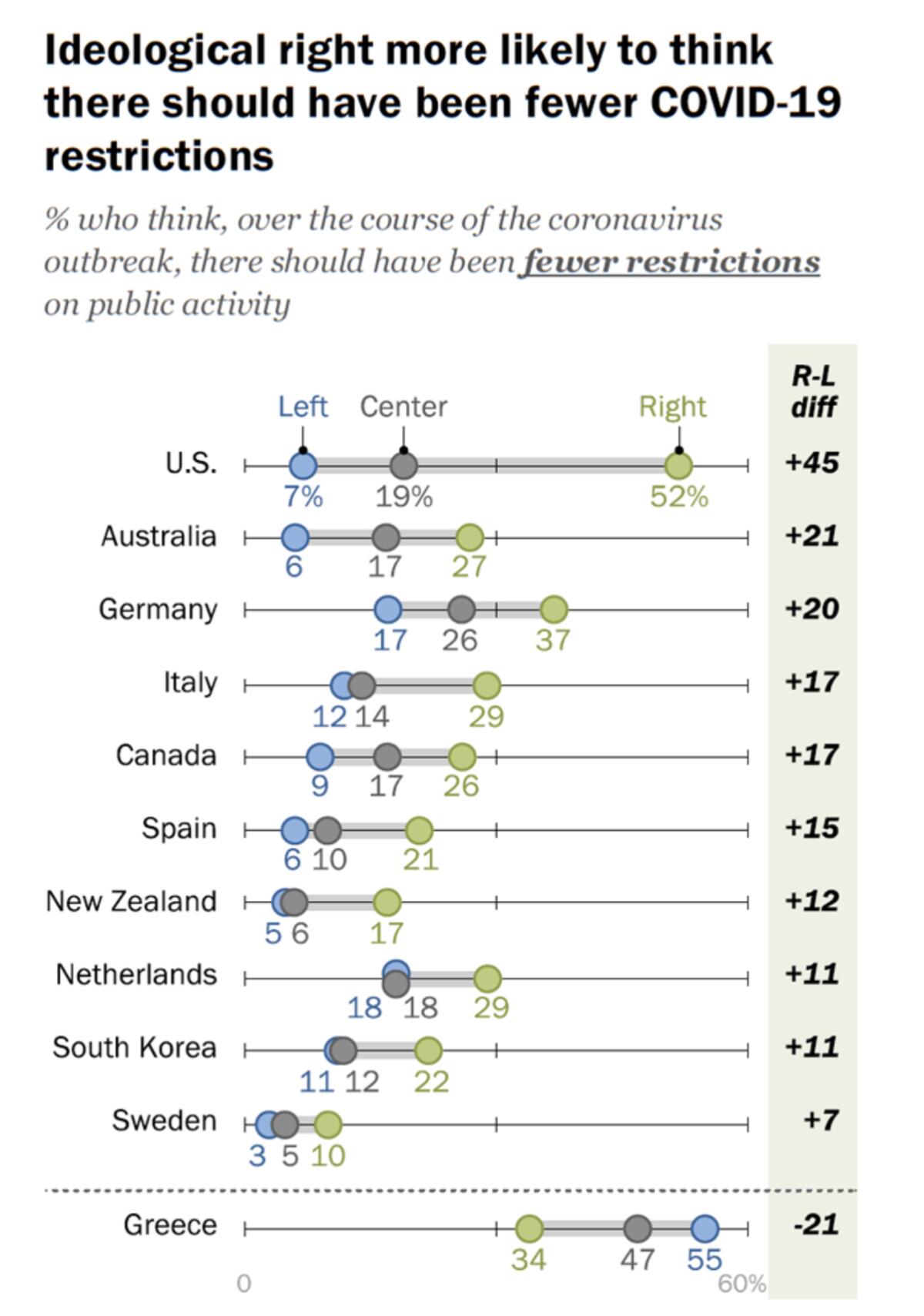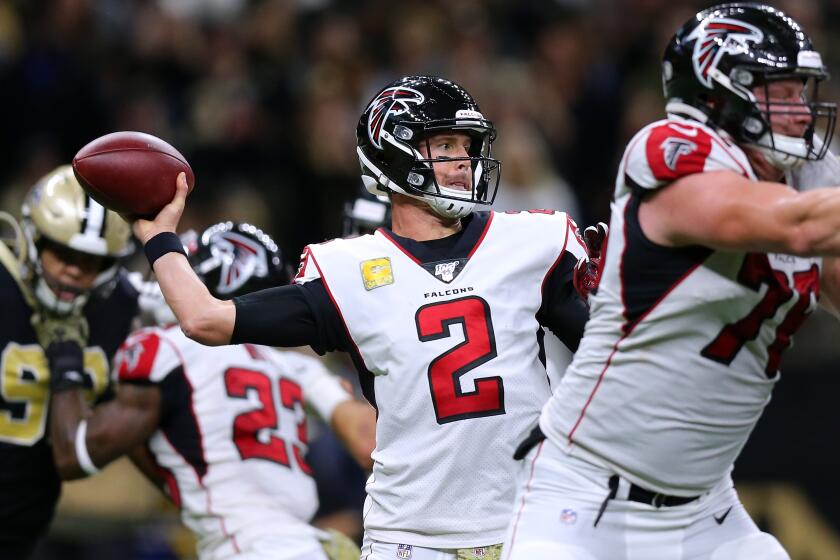Column: Why have so many Americans abandoned the war against COVID-19?

- Share via
Wars are ugly, and that goes double when they’re being lost.
It goes triple when they’re lost while they’re still winnable.
Based on what you may be hearing from veteran American military hawks, you may think this is a reference to the war in Afghanistan, which in reality was lost before U.S. troops even began to arrive 20 years ago. But no: It’s a reference to the war against COVID-19.
If @joebiden illegally mandates vaccine, I will take every action available under the law to protect South Dakotans from the federal government.
— South Dakota GOP Gov. Kristi Noem gives up on the war against COVID-19
Our weapons against the pandemic are consistently improving. On Monday, the vaccine developed by Pfizer and BioNTech won formal approval from the Food and Drug Administration; approval for the similar vaccine made by Moderna is expected within a few months.
Those steps may open the door to vaccination mandates, which can only improve vaccination rates.
Get the latest from Michael Hiltzik
Commentary on economics and more from a Pulitzer Prize winner.
You may occasionally receive promotional content from the Los Angeles Times.
“I’m calling on more companies in the private sector to step up the vaccine requirements that will reach millions more people,” President Biden said after the agency’s announcement. “If you’re a business leader, a nonprofit leader, a state or local leader who has been waiting for full FDA approval to require vaccinations, I call on you now to do that.”
Meanwhile, scientific understanding of COVID-19‘s mechanisms is expanding rapidly, pointing toward more effective treatments and away from heavily promoted but useless nostrums.
Yet with every step forward we seem to take a step back from a winning strategy against the enemy. Partisan resistance to vaccination mandates and mask-wearing rules remains unshakable in some parts of the country, notably the Southeast.
More experts are saying the voluntarily unvaccinated should pay for the consequences of their decision.
Pockets of resistance have emerged where one would never have expected them, such as among healthcare workers, police officers and firefighters.
This isn’t the only example of Americans turning their backs on obvious solutions to a deadly pathology. It resembles resistance to gun control, which remains politically potent despite years of mass bloodshed, including the 2012 slaughter of 26 people, including 20 children 6 and 7 years old, by a firearm-bearing attacker at Sandy Hook Elementary School in Connecticut.
This is happening even as evidence mounts for the efficacy of the vaccines — and the dangers for unvaccinated people. News outlets are brimming with reports of prominent anti-vaccination advocates who discovered their error too late, on their deathbeds.

Dick Farrell, a right-wing radio host in Florida who told listeners that reports of the pandemic’s seriousness were “lies,” died Aug. 4, after admitting to friends that he wished he had been vaccinated.
Phil Valentine, a right-wing radio personality in Nashville who spread vaccine misinformation (“Why would I risk getting a heart attack or paralysis by getting the vaccine?” he said), died Aug. 21 as his family urged followers, “PLEASE GO GET VACCINATED.”
Evidence is also mounting for the folly of blocking social distancing requirements, including mask mandates, as several red-state government leaders have done.
In Florida, where GOP Gov. Ron DeSantis has positioned himself as a leading foe of mask mandates in schools and vaccination mandates by private businesses, Orlando officials asked residents to stop watering their lawns and washing their cars last week. The goal is to preserve supplies of oxygen, which is used both for water treatment and for respiratory treatment for patients suffering from COVID-19, who have been filling local hospitals.
Faced with vaccine hesitancy among players, the NFL put its foot down.
Florida is experiencing a surge in daily death tolls from COVID-19 that exceeds its peak in January and February. Yet DeSantis hasn’t shown any signs of reconsidering his policies, which include demonizing Dr. Anthony Fauci, the federal official most closely identified with urging social distancing; DeSantis’ political campaign website is still hawking T-shirts reading “Don’t Fauci My Florida.”
He’s not alone in trying to block anti-COVID-19 measures. Georgia GOP Gov. Brian Kemp last week signed an executive order allowing businesses to flout local ordinances such as mask requirements.
“Local governments will not be allowed to force businesses to be the city’s mask police, the vaccine police or any other burdensome restriction,” Kemp declared. In Georgia, the average daily new coronavirus case rate has soared in recent days to 635 per million population, almost matching Florida’s nation-leading rate of 680 per million.
In Texas, Republican Atty. Gen. Ken Paxton boasted on Monday of having won a court injunction blocking a vaccination mandate imposed by the San Antonio schools for all employees.

Hospitalizations of unvaccinated patients cost the U.S. healthcare system some $2.3 billion in June and July alone, according to an estimate by the Kaiser Family Foundation. The foundation reckons that 113,000 hospitalizations, among the 134,000 adults admitted for treatment primarily for COVID-19 during those months, could have been prevented by vaccination.
The cost of those unnecessary hospitalizations is borne “not only by patients but also by society more broadly, including taxpayer-funded public programs and private insurance premiums paid by workers, businesses and individual purchasers,” the foundation observed.
What accounts for the abandonment of the winnable war against COVID-19 by these Americans?
Part of the problem is the easy spread of anti-vaccine misinformation and disinformation by social media platforms that don’t adequately take action against these lies. According to a nonprofit watchdog group, only about a dozen sources are responsible for the vast majority of anti-vaccine posts (led by the longtime anti-vaccine figures Joseph Mercola and Robert F. Kennedy Jr.).
State medical boards are warning doctors not to spread COVID falsehoods, but will that stop them?
That should make it fairly easy to shut down the flow, but Facebook, a prime venue for anti-vaccination lies, says it’s not that simple: Some materials tagged as anti-vaccination are actually just factual reports of anti-vaccination debates, the company says.
It’s tempting to attribute doubts about anti-COVID-19 measures to America’s political polarization, but that’s misleading. A survey by the Pew Research Center reveals that the political divisions in the U.S. over COVID-related restrictions resemble those of other developed countries — with one distinction: America’s right wing is far more opposed to restrictions than the right in those other countries.
Asked if they think there should be fewer COVID-19 restrictions, only 7% of Americans identifying themselves as members of the left and 19% of those in the center agree, about the same as in Germany, Australia and Canada. But 52% of self-defined members of the American right oppose restrictions, compared with 27% in Australia, 37% in Germany and 26% in Canada.

That may explain why conservative politicians have taken such a strong stand against vaccination and masking mandates: It’s a sign of partisan orthodoxy. This week, South Dakota’s GOP governor, Kristi Noem, expressed the principle in the starkest terms. “If @joebiden illegally mandates vaccines,” she tweeted, “I will take every action available under the law to protect South Dakotans from the federal government.”
The federal government has not imposed any sort of vaccine mandate, and the Biden White House has consistently said it has no intention of doing so. But Noem scored her chosen point.
Opposition to mask mandates was established as a partisan litmus test by former President Trump, whose instinct for divisiveness found another outlet in the pandemic. He was unique among living former presidents in not publicly urging vaccination, until very recently.
But he has now discovered that once the poison of partisanship is injected into the body politic, it can be hard to eradicate it. This weekend, Trump was booed at a rally in Alabama for urging his supporters to get vaccinated. (Another take on this phenomenon dates from the French Revolution: “The revolution devours its own children.”)
Trump, to be sure, larded his statement of support for vaccination with obligatory bows to “freedom” — that is, the freedom to refuse the vaccine and therefore risk infection. Earlier, on Fox Business, he undermined the Biden administration’s push to get booster shots to especially vulnerable populations by calling the booster campaign “a money-making operation for Pfizer.”
“Political rhetoric about freedom has served as a trap, allowing only the limpest of responses,” former Medicare and Medicaid official Andy Slavitt, the author of “Preventable,” a new book about America’s failed response to the pandemic, asserted recently on Twitter. “Freedom & vaccines are now defined as opposites,” which “makes everyone’s job harder,” he observed.
Slavitt is right. America has been blessed with an abundant supply of vaccines that offer indisputable protection from a pandemic, available to residents for free. Yet millions of people turn them away. Giving up on a war that can be won has become a new American pathology, and a deadly one.
More to Read
Inside the business of entertainment
The Wide Shot brings you news, analysis and insights on everything from streaming wars to production — and what it all means for the future.
You may occasionally receive promotional content from the Los Angeles Times.














